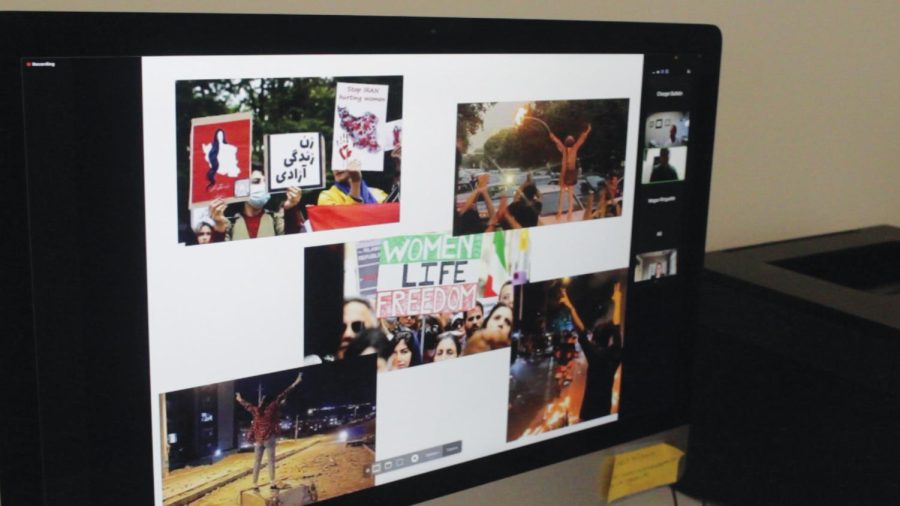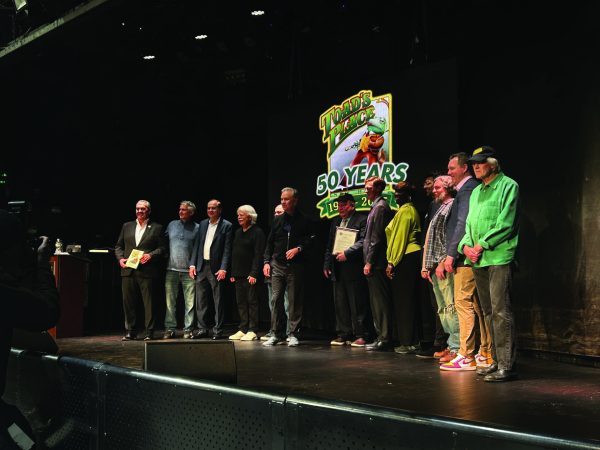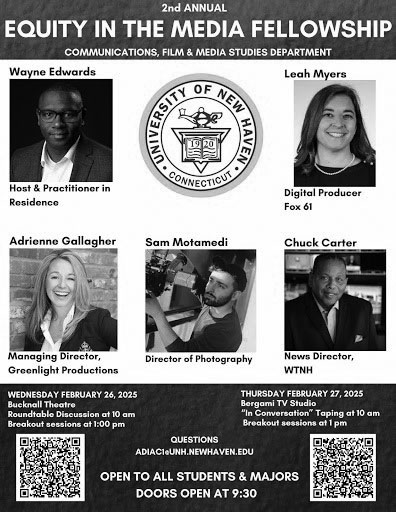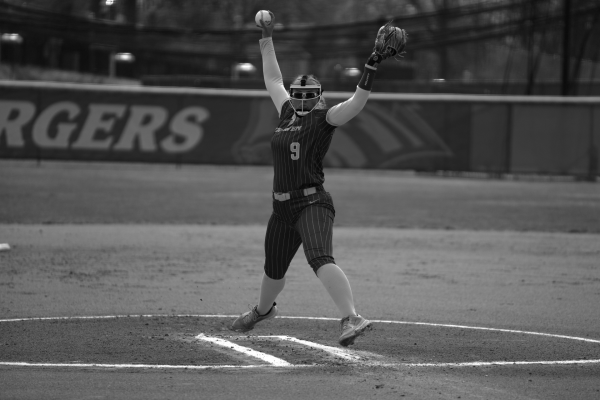Students and faculty discuss impacts of Iranian protests at ‘Courageous Conversation’ panel
Photo courtesy of Charger Bulletin/Samuel Weinmann.
A picture of the Zoom call during the “Courageous Conversation” panel, West Haven, Oct. 12, 2022.
For nearly a month, protests have been surging throughout Iran, sparked by the death of 22-year-old Mahsa Amini, who was beaten by the country’s morality police for wearing tight clothing and for “improperly” wearing her hijab.
As protests aren’t entirely uncommon for Iran, these protests have caused many to wonder: will these protests be any different than before, and can they lead to real change?
This topic was addressed at a panel held on Wednesday evening, called “Woman, Life, Freedom: Iranian Women’s Fight for Liberation.” As a part of the Courageous Conversation series, the panelists at the event included Silvia Marsans-Sakly, a history professor from Fairfield University, and Maryam Kamali, an adjunct professor of history at the University of New Haven.
The panel, held on Zoom, was hosted by Dean of Students Ophelie Rowe-Allen and moderated by Senior Associate Dean of Students Ric Baker. After being introduced by Baker, Kamali was the first to discuss the situation in Iran.
As an Iranian woman, Kamali prefaced the topics that she was going to discuss, saying “it is hard for me to speak about this topic because at this moment there is a revolution going on in Iran that… has [included the] killing of my compatriots, including men, women and children.”
She said that despite this, it is a “pleasure for me to talk about this issue, because I am an Iranian woman who knows and who has experienced all the suffering that has happened to Iranians.”
Kamali’s presentation was about what motivated women to fight and protest after the 1979 Revolution, which led to the current regime that Iranians are now protesting.
To give context to how Iran was before the revolution, she said “Women like me were born in the dark age that began after the 1979 Revolution…My generation did not know what rights women enjoyed in Iran in the very recent past.”
To highlight this visually, she showed images depicting Iranian culture prior to the revolution, where women weren’t required by law to wear hijabs, and where women weren’t so highly separated from men.
After discussing the rise of the Islamic Republic, Kamali said “The compulsory hijab was only a cover for deeper and more rooted foul, which was the misogynist bout of the mullah.”
She said that over the past 40 years, one of the main factors to more protests was women realizing “that their roles were once again changing from decision-making agents, to those who have no role or no significant role in society.”
As these restrictions on women’s rights weren’t changing, and even becoming stricter in recent years, this led to a higher prevalence of protests in the country, such as the 2009 protests, the 2016 protests and the 2019 protests, all causing thousands of protestors to be murdered by the Iranian government.
Although there have been multiple large-scale protests in Iran throughout the past 40 years, this one differs in many ways, according to Kamali. Referencing the intergenerational collaboration between teenagers and adults, as well as the inclusion of men in these protests, she referenced that there is more support among Iranians than there has ever been before.
“The pioneers of this movement are not necessarily highly educated women. In Iran today… young women…are leading this revolution while facing guns and bullets,” she said.
“They cut their hair in mourning for Mahsa Amali and other young women and even children who are killed, for the freedom of Iran and Iranians.”
Before concluding her section of the panel, Kamali left with a call to action.
“I, as an Iranian woman, on behalf of the people of Iran, ask you to hear the voice of the Iranian people’s revolution and to convey it to other people.”
Kamali’s portion of the panel was followed by Marsans-Sakly, who discussed her observations on the Iran protests as an “outsider.” Although she said she was an outsider, she said that she has a special research focus on protests, but more specifically the Arab Spring protests.
After giving another overview of the Iranian protests, Marsans-Sakly said “The important thing I think about this protest and the forms it has taken… is that it is… being played out on a woman’s body. How far can the state go in trying to control what a woman puts on her body and where the body moves?”
Marsans-Sakly used the current situation to draw parallels to situations in other countries, like the widespread abortion restrictions in the United States. This was used to draw upon a larger commentary on patriarchal norms and the impact that they have on women throughout the world–but specifically Iranian women.
“Patriarchal norms disproportionately impact women…it institutionalizes and symbolizes a kind of political stranglehold.”
One of the primary talking points from Marsans-Sakly was the impact that ongoing sanctions have on Iranian politics, and the impact that they have on women specifically.
“You cannot ignore that Iran is the most sanctioned country after Russia right now in the entire world, and [that] those sanctions are also a form of siege warfare,” she said.
The sanctions “enhances the power of those who have the power of the state [and] paradoxically, it strengthens the hardliners,” Marsans-Sakly added, discussing how the severe sanctions on Iran impact the people of Iran–and more specifically the women–who bear the brunt of the economic turmoil.
After discussing the parallels that these protests have with other protests like the Arab Spring protests, as well as how Iranian protests tend to be the harbinger of other protests in the Middle East, Marsans-Sakly concluded her portion of the panel by saying “I think this is a reminder for all of the oppressive leaders and the resistance movements that stand up to the bullets… that people remember, and maybe the battle might not be long this time around, but it will someday, and that’s all I’ve got to say.”
After the two panelists finished their presentations, Baker opened up the discussion to questions, starting with Ali Montazar, a professor of industrial and systems engineering at the University of New Haven.
Montazar mentioned how there have been many uprisings over the past century, and said “This [protest], to me, and to many that I have spoken with, feels different… I wonder… [how] do you see it from being different from other uprisings?”
Kamali responded, saying “this one is different for many reasons… This is something from the bottom; it is not from the top. There are some people, there are some [organizations with] ideals that support this movement, but those who are leading the movement are people… on the streets, not any big names.”
After Montazar, Shima Hojjati, a graduate business administration student, commented on the impact of social media on protests. She said “I feel like all the time they try to keep us silent, and now we [can] bring our voices out.”
Elaborating on social media, she said “I believe that social media can be a… game changer, and I’m so happy that…my generation doesn’t just observe.”
Touching upon her own experience with having family and friends in Iran, Hojjati said “The amount of emotions that we are experiencing every day is so overwhelming…we experience sadness, and then anger and then you will find yourself crying…”
Ali Gobalzi, an undergraduate and graduate program coordinator for the electrical engineering, computer engineering and computer science department, commented on Iran’s relationship with Western countries. He said that Iran needs support from western European countries and from the United States, urging western countries to take caution.
Specifically, he urged European countries and the United States to “not fall into the traps of the negotiations regarding the nuclear deals with Iran and leave people behind.”
He then concluded, by saying “I think the message from the streets is…please…do not subsidize the bullets that go into the hearts of the people now.”
To view this entire segment of the Courageous Conversation series, visit your MyCharger page.
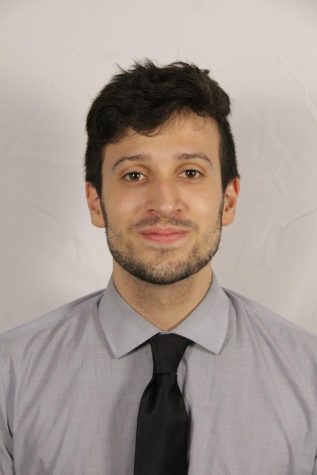
Samuel Weinmann is a passionate journalist who is a junior international affairs major at the University of New Haven. As the editorial head of the Charger...



